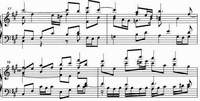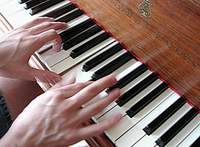MUSIC WITHOUT HASSLE (17 april 2004)
One of our neighbours has a piano in the house - just like we do.
She does not play a lot, so please don't think I'm complaining. I'm just a bit surprised that she hardly ever plays anything but scales. After all, what's the fun of playing scales?

What I'm also surprised about is the fact that piano teachers usually want you to learn notes and and correct fingering.
I'm wondering about people who start to learn playing the piano at an older age: would they expect eventually to play Bach inventions, Chopin nocturnes and Mozart sonatas? If that's what they want - they'll have to learn notes and fingering. And they will have to practise very hard one or two hours a day - for many years.

If people don't really want this, why should they torture themselves with notes and fingering. To be honest, I have not met many late starters who managed to master notes and fingering very well.

But most people will be quite happy if they just learn to play nice tunes like Green Sleeves or Autumn Leaves, or if they can sing and accompany themselves on the piano.
Conventional melodies are based on chords. Children's tunes are usually based on no more than three chords. You don't have to be a musical genius to learn three chords and accompany yourself while you sing. And if you have some sense of music, you can make it sound acceptable.
In a later stage you can try to play the melody, instead of singing it.
As you learn to play more chords, you will automatically develop your sense of music and you'll learn to move your fingers on the piano.
"But what if I have no sense of music at all?" you may wonder. Well, most people can sing. But if you really have no sense of music at all, it's perhaps better not to go to so much trouble.
If this is any comfort to you, I'll make a confession: I have no sense of football and I'll never learn to play it.